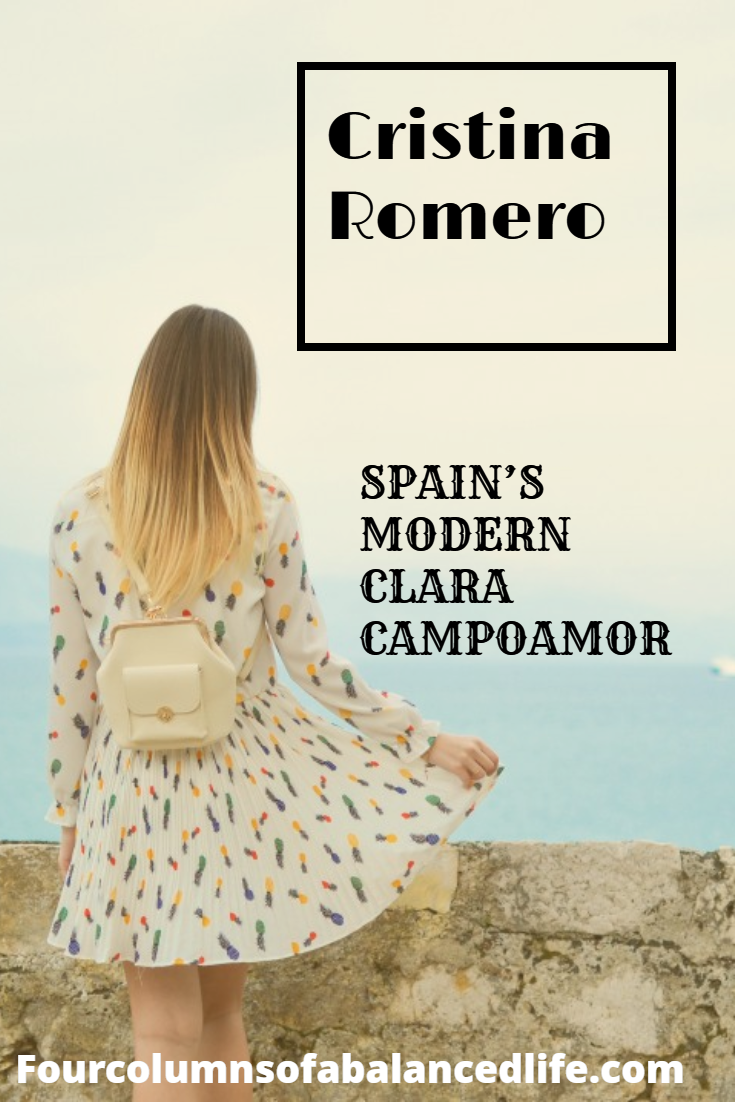Cristina Romero: Spain’s Modern Clara Campoamor


Cristina Romero is a Spanish blogger and I catch up with her and discuss life.
Cristina, a pleasure to interview a fellow blogger. Tell my audience something important about you?
Thank you very much, Jerry. I could be compared with the hands of a clock. In other words, I am always “functioning”. I am a very active person and I don’t stay put. I do not think there are enough hours in a day to do everything I would want to do. I am very human; my heart drives me. I like to help people around me. As a result, I find it worthwhile because that shapes the person I am. In conclusion, I am a woman that is very independent, very devoted to others, with clear ideas on her mind and who doesn’t settle.
Tell me a little about your blog and why did you decide to blog?
My blog is the start of a new phase in my life. After having worked in media and communications, I stopped working full time to take care of a family member.
After two years, I created the trademark “by Tina” and designed a handbag collection of different types of material, which were made in Spain. The fixed costs were high and I did not have any financial backing. I, therefore, decided to pursue something that I liked which is writing and having my own blog.
It was challenging at the beginning and a new world for me. I thought through the whole process and designed the website by myself. I am a perfectionist by nature. I took courses on blogging and www.elblogdetina.es was born.
The blog is about my thoughts, reflections, and state of mind on various topics like a visit to a restaurant, my kids, or just cooking. It is a journey.
What kind of journalism do you specialize in? What do you like about journalism?
I have worked in the press and radio. I did not like what I saw when I started working for different media companies. To my mind ethics are a key feature of individuals, and this should be even more highlighted when you work in the “fourth power”. When I was faced with the truth about journalism, I was hugely disappointed. My ideas around journalism pictured the great reporter investigating for news but the reality is very different. The news is delivered to you by the big press agencies and that is a debacle for your ideas.
What does female empowerment mean to you?
I believe women need to have their own dignity, be independent, and have their rights acknowledged. I further think that Spain where I live, men and women have the same rights and opportunities (at least from a legal perspective, which sometimes plays out differently in practice).
When I was born, I had the same opportunities as my brother and the same is true for my friends. Maybe if you look back two generations it was odd to see the same number of men and women study, but nowadays any child born, be it a boy or a girl, will go to school and have the opportunity to go to university and have a future. I don’t see women as a prejudiced social group in Spain because of being born female.
I think that the word empowerment is fully compatible with women, as the word indicates, gain control over their own lives and circumstances. Maybe it is actually the circumstances each of them faces in her life that makes that woman give up on her professional life (be it because she has kids she wants to raise so that she can be independent in the future or because she has a disabled relative who she needs to take care of or due to other reasons…). And it is here where I see that laws don’t work properly: both a woman and a man should be able to take care of their families and home without giving up on financial independence, but there is no government help for this.
How has social media changed your society?
Social media has allowed people to have a broader view of life. In other words, not everything is controlled by the same media. Therefore, the freedom to express yourself has substantially increased. It is a great tool to exchange information and has led nowadays to a steep change in mass media.
Spanish society has evolved positively in a lot of ways on the back of social media as it has given everyone a voice. The flipside of this is that it gives rise to abuse, to people manipulating social media to achieve their goals or to professional haters hiding behind the anonymous status a profile gives them, but that can be mitigated by the right of every individual to choose what he wants to read, follow or do.
Help me understand some of the challenges you have faced in life and how did you overcome it?
The first was in the workplace. In order to move up in the media world, I faced, as we say in Spain, “pasar por la piedra”, It means as a woman if your boss comes and tells you that in order to progress you have to have dinner with him (or do anything, as we have recently seen in the cinema world) and when you say no he makes your professional life unbearable until you quit.
Another tougher challenge was when the CEO of my company told all female employees that he didn’t want any of us to get pregnant and that if we did no one could in “his” company (which wasn’t actually his) apply for a part-time job as is set out by Spanish law. When my second child was born, I decided to focus more on my family, and therefore against the will of my boss I notified HR that I applied for the reduced working hours that I was entitled to. They couldn’t obviously object but they made life difficult until I voluntarily left. That challenge has been very important and thanks to the fact that I actually sent that notice to HR and subsequently left women can (and do) now have different options of working hours in that company and can find a work-life balance.
The third challenge was that I was in a relationship with a male chauvinist. When I wore a skirt, it was too short and he wanted me to wear pants. He did not want me to drive and was emotionally abusive.
He was very controlling, negative and it had a deep impact on my personality. He was very aggressive in his character. I became aware of his negative impact on me and mentioned that I wanted to end the relationship. He became manipulative, by threatening to jump out of the window, screaming, and even broken a door to get into the room I had locked myself in.
However, I decided to quit this toxic relationship, as I would never be happy and called it off. We should be free in a relationship and not be subdued and unhappy. I still have to see him because of certain issues but I have learned to forgive and have pity on him.
Talk to me about Spanish society and is it still patriarchal or an equal society?
Spanish society is undergoing constant change. In the last few years, it has changed significantly and there is a long way to go. Spain has a constitution since 1978. We were coming from a completely patriarchal society, where women’s role was basically to be the wife of someone and raise the kids whilst staying at home (with some exceptions). Women gained the right to vote in the 30s, notably 1933 and it was strange to find women studying in university and having a job linked to their career thereafter. The change was accelerated in 1978 and since then boosted, and it has only been 41 years! It is amazing to see how everything has changed since now we live in an equal society.
As I said, most women are free to decide what they want to do in life and if they want to continue with their career or prefer to devote more time to their family and give up a professional career. But there is still a lot to improve regarding maternity leave and the way back to work once it is finished. Rejoining your job isn’t easy and sometimes your salary is not worth it. A lot has to change. You can of course always decide to start your own business and try to balance family life and work that way, but not everyone has the financial capacity to be able to do that and the government doesn’t, unfortunately, help much. On top of that, not everyone has the personality you need to start your own business and prefers to settle for a company or, if you are a woman after maternity leave, stay at home.
Walk me through some of the best restaurants in your city?
The restaurant scene has exploded in Madrid in the last decade.
There is a choice for every palate and wallet. From eating fantastic pinchos in the San Antón market to a nice plate of pasta in an Italian restaurant such as Don Giovanni, Mediterranean food as in La Ancha or El Qüenco de Pepa, nice fish in el Barril or go to restaurants that are more trendy where fusion food or Japanese food are growing such as Amazonico, Bibo, Sushi 99, Inari and many others…. you can also have a great piece of Brazilian meat in Rubaiyat. This is all on top of your classic paella or other rice dishes like in St. James restaurant, but Spanish food goes way beyond paella. A very welcoming restaurant where you have great food is La Buena Vida, with one of the best cheesecakes in town. Another one of my favorites is Taberna Laredo. I could go on forever…
What is your city famous for and why should we visit it?
Madrid is 1000 years old, historic and one of the greatest European capitals. It is a thriving, cosmopolitan city with a dynamic cultural scene and amazing weather.
Food is an obsession (not least the Mediterranean diet has been considered the most healthy diet worldwide) and there is plenty to choose from as madrileños tend to go out a lot…
On top of that, if you have enough of Madrid, which is very difficult to happen, you have amazing places nearby, including several world heritage sites like Toledo, or the Roman aqueduct in Segovia, or the walls of Avila…all within less than an hour drive.
How do you find balance in modern-day society and what are your priorities?
I think we have gone very quickly from one extreme to the other, from not having the technology available to having access to everything. New technologies bring with them a lot of good things but also give rise to something that is very bad: social isolation. It is very sad when for example I am having dinner in a restaurant and look around me and see most people with their mobile phones, teenagers meeting their friends and each of them just looks at their mobile, rather than speaking to each other, playing cards… there should be more education on the bad use of technology in order to foster healthy, natural and true relationships.
If when you raise kids you should impose time limitations on the use of technology. At home we have rules for the use of technology (including the fact that when we have lunch or gather with our family or friends we can’t use technological devices) and, to be honest, life is good that way because at the end of the day we are people and personal relationships should still be channeled through conversations and face to face instead of through phones or screens.
Balance in modern life would to me be complete equality of rights between men and women, that we were all free people with the ability to think for ourselves, without being conditioned by anyone and that we could all study and work to be truly independent.


Great interview of a rising star… a striking personality!
Congrats Cristina, amazing description of the reality we suffer, big threats around us which have to be face as you do, clearly, honestly and generously with our people and the with all society. Thank you so much for this contribution to all of us, hope has the distribution it deserves.
Maravillosa entrevista, actual y réflexiva. Un diez.
Amazing interview. It is current and reflective of our society. Ten on ten
Perfect description of past and present of Spain. Bravo for women like this.
Very, very, very good photos and very, very pretty lady.
An interview that hints at a struggler and worker. We need more women in Spain with as much force as Cristina!
La primera vez que las españolas votaron en igualdad con los hombres fue en las municipales de 1925, bajo la dictadura del general Primo de Rivera y el reinado de Alfonso XIII (por primera vez en Europa) y en las elecciones generales defendió el voto Clara Campoamor. Una de las primeras mujeres abogadas en ejercer que dedicó toda su vida a defender los derechos de la mujer española.
La dignidad y la libertad no son negociables. BRAVO 👏👏👏👏👏🌹🌹🌹🌹😘❤️ Marisol.
The first time that the Spaniards voted in equality with the men was in the municipal ones of 1925, under the dictatorship of the general Primo de Rivera and the reign of Alfonso XIII (for the first time in Europe) and in the general elections defended the vote Clara Campoamor. One of the first women lawyers to practise who dedicated her whole life to defending the rights of the Spanish woman.
Dignity and freedom are not negotiable.
Stunning person!! She is genuine, caring, professional but mainly deeply human!!
She is awesome person… great job jerry
Jerry, thank you very much for the great job with the interview. It has been a pleasure!!